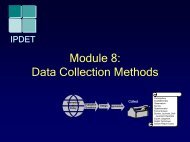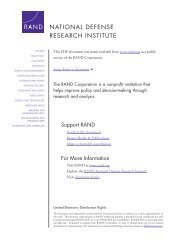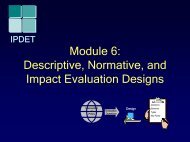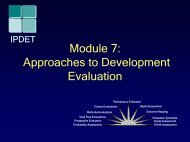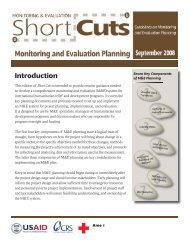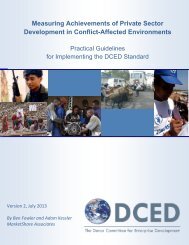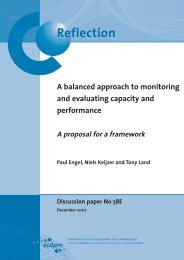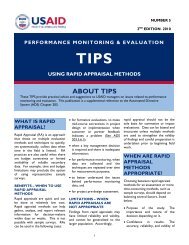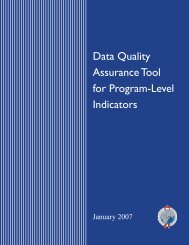Module 1: Introduction to Development Evaluation
Module 1: Introduction to Development Evaluation
Module 1: Introduction to Development Evaluation
You also want an ePaper? Increase the reach of your titles
YUMPU automatically turns print PDFs into web optimized ePapers that Google loves.
IPDET<br />
<strong>Module</strong> 1:<br />
<strong>Introduction</strong> <strong>to</strong> <strong>Development</strong><br />
<strong>Evaluation</strong><br />
What?<br />
Professional<br />
Associations<br />
Origin & His<strong>to</strong>ry<br />
Principles and <strong>Development</strong> <strong>Evaluation</strong><br />
Standards<br />
Context<br />
OECD DAC Criteria
<strong>Introduction</strong><br />
• <strong>Evaluation</strong>, What Is It?<br />
• Origin and His<strong>to</strong>ry<br />
• <strong>Evaluation</strong> <strong>Development</strong> Context<br />
• Built on OECD DAC Criteria<br />
• Principles and Standards<br />
• Growth of Professional Associations<br />
IPDET 2 2
OECD Definition of<br />
<strong>Evaluation</strong><br />
<strong>Evaluation</strong><br />
• the process of determining the worth or<br />
significance of an activity, policy, or<br />
program<br />
• an assessment, as systematic and<br />
objective as possible, of a planned, ongoing,<br />
or completed intervention<br />
IPDET 3 3
Kinds of <strong>Evaluation</strong>s<br />
• Formative<br />
– focus on improved performance before and during<br />
implementation (project, program or policy)<br />
• Summative<br />
– focus on outcomes (consequences)<br />
• Prospective<br />
– answer questions<br />
• Is this program/project/policy worth evaluating?<br />
• Will the gains be worth the effort/resources expended?<br />
IPDET 4 4
Purpose of <strong>Evaluation</strong><br />
•Ethical<br />
• Managerial<br />
• Decisional<br />
• Educative and Motivational<br />
IPDET 5 5
What <strong>to</strong> Evaluate?<br />
•Projects<br />
• Programs<br />
• Policies<br />
• Organizations<br />
•Sec<strong>to</strong>rs<br />
• Thematic<br />
• Country assistance<br />
IPDET 6 6
Uses of <strong>Evaluation</strong>s<br />
• Give feedback on the performance of policies,<br />
programs, and projects<br />
• Make policies, programs, and projects<br />
accountable for how they use public funds<br />
• Help stakeholders learn more about about<br />
policies, programs, and projects<br />
• Carried out around the needs of the primary<br />
intended user<br />
• Clarify theory of change (logic model) for<br />
projects, programs, and policy<br />
IPDET 7 7
<strong>Evaluation</strong> Provides<br />
Information on:<br />
• Strategy –<br />
– Are the right things being done?<br />
• Operations –<br />
– Are things being done right?<br />
• Learning –<br />
– Are there better ways?<br />
IPDET 8 8
Moni<strong>to</strong>ring and <strong>Evaluation</strong><br />
• Moni<strong>to</strong>ring<br />
– routine, ongoing, and internal activity of tracking<br />
key indica<strong>to</strong>rs<br />
– internal activity<br />
– used <strong>to</strong> collect information on a program’s<br />
activities, outputs, and outcomes <strong>to</strong> measure<br />
performance of the program<br />
• <strong>Evaluation</strong><br />
– periodic and time bound<br />
– can be internal, external, or participa<strong>to</strong>ry<br />
– periodic feedback <strong>to</strong> key stakeholders<br />
IPDET 9
Roles and Activities of<br />
Professional Evalua<strong>to</strong>rs<br />
• Internal <strong>Evaluation</strong><br />
• External <strong>Evaluation</strong><br />
• Participa<strong>to</strong>ry <strong>Evaluation</strong><br />
IPDET 10 10
Internal, External, and<br />
Participa<strong>to</strong>ry Evalua<strong>to</strong>rs<br />
• Internal evalua<strong>to</strong>rs:<br />
– usually know more<br />
• his<strong>to</strong>ry, organization, culture, problems, successes<br />
– may be <strong>to</strong>o close<br />
• External evalua<strong>to</strong>rs:<br />
– have more credibility and specialized skills<br />
– independent from administration and financial<br />
decisions<br />
(continued on next slide)<br />
IPDET 11 11
Internal, External, and<br />
Participa<strong>to</strong>ry Evalua<strong>to</strong>rs<br />
(cont.)<br />
• Participa<strong>to</strong>ry evalua<strong>to</strong>rs:<br />
– representatives of agencies and<br />
stakeholders (including beneficiaries) work<br />
<strong>to</strong>gether in designing, carrying out and<br />
interpreting an evaluation<br />
– participa<strong>to</strong>ry methods may be used in<br />
internal and external evaluations<br />
IPDET 12 12
Participa<strong>to</strong>ry <strong>Evaluation</strong><br />
(vs. Internal or External)<br />
• Distinction between experts and<br />
layperson, researcher and researched,<br />
is de-emphasized and redefined<br />
• Evalua<strong>to</strong>rs act as facilita<strong>to</strong>rs and<br />
instruc<strong>to</strong>rs<br />
• Others make the assessment<br />
• A more radical step away from the<br />
model of independent evaluation<br />
IPDET 13 13
Evalua<strong>to</strong>r Activities<br />
• Consult with all key stakeholders<br />
• Review and/or develop theory of change<br />
• Design the evaluation<br />
• Manage evaluation budgets<br />
• Perform or conduct the evaluation (or contract<br />
staff <strong>to</strong> perform the evaluation)<br />
• Identify standards for effectiveness<br />
• Collect, analyze, interpret, and report on data<br />
and findings<br />
IPDET 14 14
1980s <strong>to</strong> now<br />
mid 1970-80<br />
1950s-60s<br />
1957<br />
1940<br />
Timeline<br />
1900<br />
1880<br />
1600<br />
Expansion in<strong>to</strong><br />
global activity<br />
Profession status<br />
More routine<br />
(US and Europe)<br />
Sputnik<br />
Reconstruction<br />
after WW - Banks<br />
Medical Schools<br />
(US and Canada)<br />
Education and<br />
Social Programs<br />
Modern<br />
<strong>Evaluation</strong>s<br />
IPDET 15 15<br />
2000 BC<br />
Egypt and<br />
China
Origins of <strong>Development</strong><br />
<strong>Evaluation</strong><br />
• Audit tradition<br />
• Social science tradition<br />
IPDET 16 16
Changing <strong>Development</strong> Concepts<br />
Decade Objectives Approaches Discipline<br />
1950s<br />
1960s<br />
1970s<br />
1980s<br />
1990s<br />
2000s<br />
Reconstruction Technical assistance Engineering<br />
Growth Projects Finance<br />
Basic needs<br />
Adjustment<br />
Capacity<br />
Sec<strong>to</strong>r investment Planning<br />
Adjustment lending Neoclassical<br />
economics<br />
Country assistance Multi-disciplinary<br />
Poverty Partnerships Results-based<br />
reduction<br />
management<br />
IPDET 17 17
Significant Changes<br />
• From partial development <strong>to</strong> more<br />
comprehensive development<br />
• Toward global approaches <strong>to</strong><br />
development<br />
• From individual efforts <strong>to</strong> coordinated,<br />
participa<strong>to</strong>ry development<br />
• Toward using partnerships for largescale<br />
development challenges<br />
IPDET 18 18
Evolution and Expanding<br />
Roles<br />
Financial<br />
Audit Audit<br />
Performance<br />
Audit Audit<br />
Impact Impact<br />
<strong>Evaluation</strong><br />
Learning<br />
Focused<br />
Evalua<strong>to</strong>r as as<br />
Accountant<br />
Evalua<strong>to</strong>r as as<br />
Researcher<br />
Evalua<strong>to</strong>r as as<br />
Facilita<strong>to</strong>r<br />
IPDET 19 19
<strong>Development</strong> <strong>Evaluation</strong>:<br />
• A sub-discipline of classical evaluation<br />
• Uses a variety of methodologies and<br />
practices<br />
• Mixed methodologies work best<br />
IPDET 20 20
<strong>Development</strong> Assistance<br />
Committee (DAC) Criteria for<br />
Evaluating <strong>Development</strong> Assistance<br />
• Relevance<br />
– The extent <strong>to</strong> which the aid activity is suited <strong>to</strong> the<br />
priorities and policies of the target group, recipient,<br />
and donor<br />
• Effectiveness<br />
– A measure of the extent <strong>to</strong> which an aid activity<br />
attains its objectives<br />
• Efficiency<br />
– Measures the outputs – qualitative and quantitative<br />
– in relation <strong>to</strong> the inputs.<br />
(continued on next slide)<br />
IPDET 21 21
DAC Criteria for Evaluating<br />
<strong>Development</strong> Assistance (cont.)<br />
• Impact<br />
– positive and negative changes produced by<br />
a development intervention, directly or<br />
indirectly, intended or unintended<br />
• Sustainability<br />
– measuring whether the benefits of an<br />
activity are likely <strong>to</strong> continue after donor<br />
funding has been withdrawn<br />
IPDET 22 22
DAC Specific Principles for the<br />
<strong>Evaluation</strong> of <strong>Development</strong><br />
Assistance<br />
• Purpose<br />
• Impartiality and independence<br />
• Credibility<br />
•Usefulness<br />
• Participation of donors and recipients<br />
• Donor cooperation<br />
(continued on next slide)<br />
IPDET 23 23
DAC Specific Principles for the<br />
<strong>Evaluation</strong> of <strong>Development</strong><br />
Assistance (cont.)<br />
• <strong>Evaluation</strong> programming<br />
• Design and implementation of<br />
evaluations<br />
• Reporting, dissemination, and feedback<br />
• Application of these principles<br />
IPDET 24 24
Why Standards?<br />
• Promote accountability<br />
• Facilitate comparability<br />
• Enhance reliability and quality of<br />
services provided<br />
IPDET 25 25
<strong>Evaluation</strong> Standards<br />
• DAC <strong>Evaluation</strong> Quality Standards (for test<br />
phase application)<br />
– http://www.oecd.org/dataoecd/30/62/36596604.pdf<br />
• Program <strong>Evaluation</strong> Standards<br />
– www.eval.org/<strong>Evaluation</strong>Documents/progeval.html<br />
• United Nations Norms for <strong>Evaluation</strong> in the<br />
UN System<br />
– www.uneval.org/docs/ACFFC9F.pdf<br />
(continued on next slide)<br />
IPDET 26 26
<strong>Evaluation</strong> Standards<br />
(cont.)<br />
• Standards for <strong>Evaluation</strong> in the UN<br />
System<br />
– www.uneval.org/docs/ACFFCA1/pdf<br />
• American <strong>Evaluation</strong> Association (AEA)<br />
Guiding Principles<br />
– www.eval.org/Publications/GuidingPrinciples.asp<br />
IPDET 27 27
<strong>Evaluation</strong> and<br />
Independence<br />
• Independent evaluation (OECD<br />
glossary):<br />
– an evaluation carried out by entities and<br />
persons free of the control of those<br />
responsible for the design and<br />
implementation of the evaluation<br />
– the credibility of an evaluation depends in<br />
part on how independently it has been<br />
carried out<br />
IPDET 28 28
Criteria of <strong>Evaluation</strong><br />
Independence<br />
• Organizational independence<br />
• Behavioral independence<br />
• Avoidance of conflicts of interest<br />
• Protection from external influence<br />
IPDET 29 29
Growth of Professional<br />
<strong>Evaluation</strong> Associations<br />
• Increasing numbers of associations<br />
around the world, especially in the last<br />
few years<br />
• Demonstrate more value is being given<br />
<strong>to</strong> development evaluation as a<br />
profession<br />
• Organizations create a support system<br />
and allow for professionalism<br />
IPDET 30 30
International<br />
Organizations<br />
• International Organisation for<br />
Cooperation in <strong>Evaluation</strong> (IOCE)<br />
• International <strong>Development</strong> <strong>Evaluation</strong><br />
Association (IDEAS)<br />
IPDET 31 31
To continue on <strong>to</strong> the<br />
Next <strong>Module</strong> click here<br />
To return <strong>to</strong> the<br />
Table of Contents click here




